Group 21-Immigrant Services of BC
Welcome to our blog! Our group members include Ruiwen Wang who is majoring in Food and Environment, Mahdiyeh Dabestani and Chen Cheung both majoring in Food Nutrition and Health, Sashka Warner and Gabriella Switzer both majoring in Global Resource Systems, and Crescent majoring in Food market analysis. Our group is most interested in how culture influences food and eating habits in Immigrant communities. Food justice is the right of all people to healthy, accessible, affordable and appropriate food and it is an intersectional issue that runs parallel to cultural prejudice. Being one of the most diverse countries in the world, Canada welcomes new immigrants each day. Their experience of transitioning into life in Canada is often idealized in the media, and their struggles go unnoticed and unacknowledged. Several of our group members are immigrants, and we all have diverse cultures and backgrounds that influence our experiences in Canada. We want to address the cultural struggles that immigrants face in Canada through food. We are excited to get to know the seniors and explore the food resources that are culturally important to them and to help them feel more comfortable in Canada by creating an accessible map of the ingredients for the recipes they entered into their recipe book.
Introduction on Immigrant Services Society of BC:
ISS of BC serves new immigrants to Canada through their 17 offices, employing over 400 employees, who work with the community in creating and carrying-out supportive programming. They have been working since 1972 to help make the transition for immigrants from their native country to Canada as smooth as possible by helping them find jobs, housing and other support services. The incredible work that they do to welcome newcomers is invaluable. When we arrived at the office, we saw first hand, the organization at work. A family had arrived to Canada just three days prior and were at the office looking for assistance with childcare. The empathy and desire to help was palpable and the staff were so welcoming to this family. It was an exciting experience to witness a family coming to a new country and having an immediate resource and connection to a group of people and a support system dedicated to helping that family. We immediately knew we had made a great decision in selecting this project.
Now meet our group!
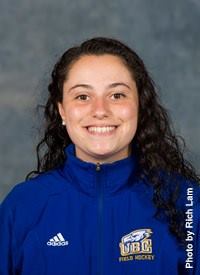 Hi! My name is Gabby, and I am in 3rd year in GRS! I am also a varsity athlete on the Women’s Field Hockey Team. I chose this project because as a Jewish person living in the diaspora, I experience cultural differences and challenges everyday. I keep Kosher, which is a similar concept to Halal in which I have food restrictions based on my religion. This influences the way that I interact with my peers in social situations. It also makes me a involuntary spokesperson for Jewish people in my non-Jewish communities.
Hi! My name is Gabby, and I am in 3rd year in GRS! I am also a varsity athlete on the Women’s Field Hockey Team. I chose this project because as a Jewish person living in the diaspora, I experience cultural differences and challenges everyday. I keep Kosher, which is a similar concept to Halal in which I have food restrictions based on my religion. This influences the way that I interact with my peers in social situations. It also makes me a involuntary spokesperson for Jewish people in my non-Jewish communities.
My experience although unique, is easier than recent immigrant’s because I was born in Canada. So although I adjust to Canadian culture, I never had to figure out how to be Jewish in this country alone because my parents and grandparents paved the way for me. If I can help create a smoother transition for immigrants with cultural/religious dietary restrictions using my knowledge and understanding about the subject, that would be awesome!
 Hi, I am Bella. I am international student from China. Currently. I am in the Food Nutrition and Health major. I like travelling, cooking and reading. I am also writing articles about food and nutrition in Chinese. I remembered when I first came to Canada, I was intimidated by the price of food. Although there are many grocery stores that sell Chinese food in Vancouver, it was hard for me to find what I needed near UBC at a decent price. It seems like if I want something healthy and fresh, I have to pay the price. Until I found a small grocery store on Broadway. The store looks dirty but the products are fresh and they have almost everything. The price was also great. This happened after I had been in Vancouver for 2 years. So I wish this project can help people to find places like this sooner than I did.
Hi, I am Bella. I am international student from China. Currently. I am in the Food Nutrition and Health major. I like travelling, cooking and reading. I am also writing articles about food and nutrition in Chinese. I remembered when I first came to Canada, I was intimidated by the price of food. Although there are many grocery stores that sell Chinese food in Vancouver, it was hard for me to find what I needed near UBC at a decent price. It seems like if I want something healthy and fresh, I have to pay the price. Until I found a small grocery store on Broadway. The store looks dirty but the products are fresh and they have almost everything. The price was also great. This happened after I had been in Vancouver for 2 years. So I wish this project can help people to find places like this sooner than I did.
 Hi everyone! I’m Crescent Yue majoring in Food market analysis. Since my mother is a doctor, she pays great attention on our health. Trying to consume a variety of nutritious food has invariably become a part of our family’s lifestyle. Due to my father’s job, our family moves around a lot. I lived and studied in more than 3 countries before, America, Canada and China. The multicultural experience helped me understand and respect other cultures more. What’s more, it made our family appreciate how crucial it is to have the sufficient availability of access to nutritional sources. I find this project a rewarding opportunity in that, having had the similar experience, I comprehend the struggle for immigrants/refugees new to the community of finding nutritious and cross-culturally suitable food to satisfy their diverse tastes and the unique needs (such as halal foods) and more. I hope at the end of our project, our team could more or less contribute to ISSofBC’s mission of “Helping immigrants build a future in Canada ”.
Hi everyone! I’m Crescent Yue majoring in Food market analysis. Since my mother is a doctor, she pays great attention on our health. Trying to consume a variety of nutritious food has invariably become a part of our family’s lifestyle. Due to my father’s job, our family moves around a lot. I lived and studied in more than 3 countries before, America, Canada and China. The multicultural experience helped me understand and respect other cultures more. What’s more, it made our family appreciate how crucial it is to have the sufficient availability of access to nutritional sources. I find this project a rewarding opportunity in that, having had the similar experience, I comprehend the struggle for immigrants/refugees new to the community of finding nutritious and cross-culturally suitable food to satisfy their diverse tastes and the unique needs (such as halal foods) and more. I hope at the end of our project, our team could more or less contribute to ISSofBC’s mission of “Helping immigrants build a future in Canada ”.
 Hi, my name is Mahdiyeh. I am in my 3rd year at UBC majoring in Food Nutrition and Health. I like gardening and growing something different and unique each year. I also enjoy cooking and traveling. I migrated to Canada when I was in grade 9 and was amazed to be exposed to the diverse cultures it offered. A few challenges I came across were adjusting to the school system here, the culture, and finding culturally appropriate food (such as halal meat). I am aware of the challenges an immigrant would come across therefore, by participating in this project I hope to help and support others by making it easier for them to find suitable food items. This opportunity to map culturally relevant nutrition and food resources for newcomers really means alot to me.
Hi, my name is Mahdiyeh. I am in my 3rd year at UBC majoring in Food Nutrition and Health. I like gardening and growing something different and unique each year. I also enjoy cooking and traveling. I migrated to Canada when I was in grade 9 and was amazed to be exposed to the diverse cultures it offered. A few challenges I came across were adjusting to the school system here, the culture, and finding culturally appropriate food (such as halal meat). I am aware of the challenges an immigrant would come across therefore, by participating in this project I hope to help and support others by making it easier for them to find suitable food items. This opportunity to map culturally relevant nutrition and food resources for newcomers really means alot to me.
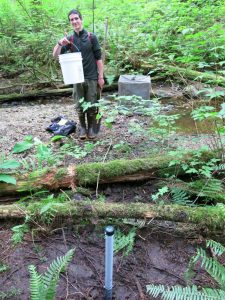 Hi, my name is Sashka! I am a 3rd year UBC student in the faculty of Land and Food Systems majoring in Global Resource Systems (B.Sc) with a focus on water resource management and hydrology. I enjoy running and playing the guitar. I chose this project because I was drawn to the idea of helping people new to Canada find familiar and culturally-appropriate food resources. In a previous UBC Spanish course I worked with other UBC students and REACH Community Health Centre to construct a recipe book providing techniques for using ingredients local to the lower mainland for immigrants from Latin America. We translated recipes into Spanish, and edited texts to create a resource for learning the process of incorporating local ingredients into meals for immigrants new to BC. However, finding culturally-appropriate ingredients and meals can be challenging in a new environment. I was intrigued by this project as it places an emphasis on facilitating and preserving traditions from other countries and ethnicities as opposed to forcing newcomers to assume North American customs. Through this project I hope to (in a small way) help smooth the process for newcomers of adapting to life in Canada.
Hi, my name is Sashka! I am a 3rd year UBC student in the faculty of Land and Food Systems majoring in Global Resource Systems (B.Sc) with a focus on water resource management and hydrology. I enjoy running and playing the guitar. I chose this project because I was drawn to the idea of helping people new to Canada find familiar and culturally-appropriate food resources. In a previous UBC Spanish course I worked with other UBC students and REACH Community Health Centre to construct a recipe book providing techniques for using ingredients local to the lower mainland for immigrants from Latin America. We translated recipes into Spanish, and edited texts to create a resource for learning the process of incorporating local ingredients into meals for immigrants new to BC. However, finding culturally-appropriate ingredients and meals can be challenging in a new environment. I was intrigued by this project as it places an emphasis on facilitating and preserving traditions from other countries and ethnicities as opposed to forcing newcomers to assume North American customs. Through this project I hope to (in a small way) help smooth the process for newcomers of adapting to life in Canada.

Hi, My name is Ruiwen. I’m a third year Food and Environment student, which mainly focuses on agroecology, ecological services and food communities. I enjoy sports such as soccer, basketball, and skiing. Music is also a huge part for my life. The reason I choose this project is that I was one of the new people to Canada three years ago, and it took me quite a while to figure out where to find the food resources that I want. It is also a challenge to new comers to adjust the new food culture. I want to make the food community be more “friendly” to the people that just come here, so that they can integrate into the local community in a much shorter time, and be one of the multi-cultural community.
Goals and Objectives:
PJ Vogt, a podcaster for the Gimlet hosted a show called “Raising the Bar” (2016), with a guest called Leslie Miley. Leslie Miley, the only black engineer at Twitter told his story with respect to race in the technology sector. Learning about Leslie Miley’s experience at Twitter as the only African-American engineer, and the ways in which Twitter tried to increase diversity through creating a profiling program, exemplifies the kinds of issues we will touch on through our project. We want to encourage diversity and immigration naturally, by creating a more welcoming and familiar environment, providing resources that make the transition smoother. At the same time, we want to create a relationship with our Arabic seniors, building cross-cultural connections. Profiling programs do not foster diversity, but rather they perpetuate divides. Being that our group is so diverse, we are confident that we will develop a myriad of different ideas and solutions to the problems that will arise throughout our project while prioritizing the needs of the seniors, as well as create a bond with them. As noted in the article in The Scientific written by Katherine Phillips (2014), diversity makes for better outcomes in problem solving situations. As a diverse group, we want to support the growth of diversity in Canada.
Our first goal is to assess the needs of the group. The first way we do this is looking at the recipes they provided in the recipe book and seeing which ingredients can be purchased at different shops. We must take into account affordability, accessibility and appropriateness. In this regard, we must ensure that the prices are affordable, that they are physically accessible either by bus route or walking, including wheelchair access. And we also must make sure that the foods are Halal, to provide cultural appropriateness.
We are going to be creating a map of the local shops in the Guilford area that sell Halal products and other ingredients needed to create the recipes in the recipe book made by immigrant seniors. This will help serve our immigrant group as well as new immigrants coming to Canada who have share similar cuisine, providing them with the resources to buy culturally appropriate foods. In some cases, the immigrants will be unfamiliar as to how to shop in stores that are primarily stocked with non-Halal foods, so this project is extremely important to alleviate some of the stress of that adjustment. Not only is this helpful to all parties, but it is especially rewarding for the seniors who are giving back to the community in sharing their experiences as immigrants and helping the next generation of newcomers settle. It will also help them become familiar with their neighbourhood and find places of community.
Finally we are looking forward to cooking with the seniors at the end of the project, and seeing how we interact and bond over sharing culture through food. We hope that the relationships we create throughout the project last and hopefully inspire us to continue working with the ISS of BC through other important projects in the future.
First Impressions to Date:
We met with our lovely community partner from ISS of BC, Thea Fiddick today. Along with an excellent recommendation for a local bakery, she provided us with some incredible insight into the organization as well as the project that we are collaborating on. The project that she has underway is a recipe book created by Arabic seniors that includes their stories and recipes. At the end of the book, Thea wants to add an asset map that helps to map out where the ingredients for the recipes are.
Thea was awesome and so were the other staff members like Salwa who were kind enough to spend time with us. They all seemed passionate about the projects they were working on, which spoke volumes to the kind of rewarding work we are starting.
Our target audience being primarily Arabic seniors who have immigrated and settled in the Burnaby area presents a unique set of challenges. Language is a barrier that some of us are apprehensive about seeing as it will be difficult to talk to the seniors and understand their needs and wants for the project. But, we know that there will be translators and that we will overcome the barrier.
After watching Ernesto Sirolli we were reminded that we have to avoid the paternalistic helicopter approach when considering how to go about our project. We do not know what is best for the seniors, the seniors know what’s best for themselves. Our job is to listen to their needs and use the knowledge and resources we have to meet those needs. Therefore, although we came into the meeting with a few ideas on how to approach the project, we remain open to listening to the needs of our group and prioritizing that information, using it to shape our solutions.
What we know so far are the needs of all cross-cultural seniors, wheelchair access, and short and simple bus routes. But for now we can only wait to meet with the seniors to understand the cultural component that defines their needs in order to create a plan on how to address them.
We are optimistic and eager to get the process started. For now, we are working on getting our Criminal Record checks completed, and have a tentative plan to meet the seniors in a few weeks.
Until then…
Group 21 signing off 🙂
References:
[Audio blog interview]. (n.d.). Retrieved January 21, 2017, from https://gimletmedia.com/episode/52-raising-the-bar/
Phillips, K. W. (2014, September 10). How Diversity Makes Us Smarter. Retrieved January 20, 2017, from http://www.scientificamerican.com/article/how-diversity-makes-us-smarter/
TEDTalks: Ernesto Sirolli–Want to Help Someone? Shut Up and Listen![Video file]. (n.d.).
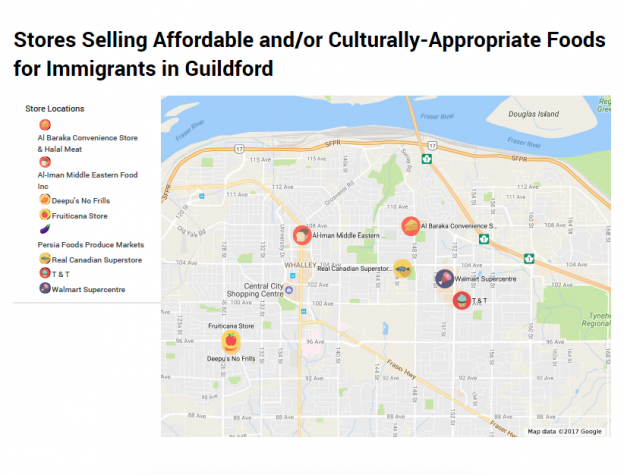
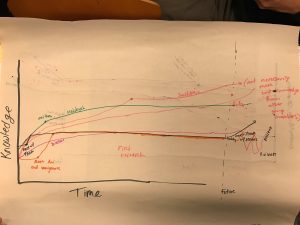
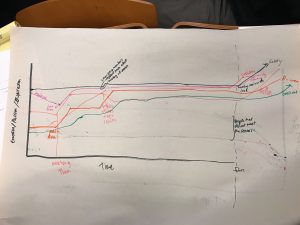

 ] for vulnerable populations which will allow all of us to cook with the seniors at the end of our project, which is another great opportunity to learn and to assess how effective and useful our map was for the seniors.
] for vulnerable populations which will allow all of us to cook with the seniors at the end of our project, which is another great opportunity to learn and to assess how effective and useful our map was for the seniors. 
 Hi, I am Bella. I am international student from China. Currently. I am in the Food Nutrition and Health major. I like travelling, cooking and reading. I am also writing articles about food and nutrition in Chinese. I remembered when I first came to Canada, I was intimidated by the price of food. Although there are many grocery stores that sell Chinese food in Vancouver, it was hard for me to find what I needed near UBC at a decent price. It seems like if I want something healthy and fresh, I have to pay the price. Until I found a small grocery store on Broadway. The store looks dirty but the products are fresh and they have almost everything. The price was also great. This happened after I had been in Vancouver for 2 years. So I wish this project can help people to find places like this sooner than I did.
Hi, I am Bella. I am international student from China. Currently. I am in the Food Nutrition and Health major. I like travelling, cooking and reading. I am also writing articles about food and nutrition in Chinese. I remembered when I first came to Canada, I was intimidated by the price of food. Although there are many grocery stores that sell Chinese food in Vancouver, it was hard for me to find what I needed near UBC at a decent price. It seems like if I want something healthy and fresh, I have to pay the price. Until I found a small grocery store on Broadway. The store looks dirty but the products are fresh and they have almost everything. The price was also great. This happened after I had been in Vancouver for 2 years. So I wish this project can help people to find places like this sooner than I did. Hi everyone! I’m Crescent Yue majoring in Food market analysis. Since my mother is a doctor, she pays great attention on our health. Trying to consume a variety of nutritious food has invariably become a part of our family’s lifestyle. Due to my father’s job, our family moves around a lot. I lived and studied in more than 3 countries before, America, Canada and China. The multicultural experience helped me understand and respect other cultures more. What’s more, it made our family appreciate how crucial it is to have the sufficient availability of access to nutritional sources. I find this project a rewarding opportunity in that, having had the similar experience, I comprehend the struggle for immigrants/refugees new to the community of finding nutritious and cross-culturally suitable food to satisfy their diverse tastes and the unique needs (such as halal foods) and more. I hope at the end of our project, our team could more or less contribute to ISSofBC’s mission of “Helping immigrants build a future in Canada ”.
Hi everyone! I’m Crescent Yue majoring in Food market analysis. Since my mother is a doctor, she pays great attention on our health. Trying to consume a variety of nutritious food has invariably become a part of our family’s lifestyle. Due to my father’s job, our family moves around a lot. I lived and studied in more than 3 countries before, America, Canada and China. The multicultural experience helped me understand and respect other cultures more. What’s more, it made our family appreciate how crucial it is to have the sufficient availability of access to nutritional sources. I find this project a rewarding opportunity in that, having had the similar experience, I comprehend the struggle for immigrants/refugees new to the community of finding nutritious and cross-culturally suitable food to satisfy their diverse tastes and the unique needs (such as halal foods) and more. I hope at the end of our project, our team could more or less contribute to ISSofBC’s mission of “Helping immigrants build a future in Canada ”. Hi, my name is Mahdiyeh. I am in my 3rd year at UBC majoring in Food Nutrition and Health. I like gardening and growing something different and unique each year. I also enjoy cooking and traveling. I migrated to Canada when I was in grade 9 and was amazed to be exposed to the diverse cultures it offered. A few challenges I came across were adjusting to the school system here, the culture, and finding culturally appropriate food (such as halal meat). I am aware of the challenges an immigrant would come across therefore, by participating in this project I hope to help and support others by making it easier for them to find suitable food items. This opportunity to map culturally relevant nutrition and food resources for newcomers really means alot to me.
Hi, my name is Mahdiyeh. I am in my 3rd year at UBC majoring in Food Nutrition and Health. I like gardening and growing something different and unique each year. I also enjoy cooking and traveling. I migrated to Canada when I was in grade 9 and was amazed to be exposed to the diverse cultures it offered. A few challenges I came across were adjusting to the school system here, the culture, and finding culturally appropriate food (such as halal meat). I am aware of the challenges an immigrant would come across therefore, by participating in this project I hope to help and support others by making it easier for them to find suitable food items. This opportunity to map culturally relevant nutrition and food resources for newcomers really means alot to me.  Hi, my name is Sashka! I am a 3rd year UBC student in the faculty of Land and Food Systems majoring in Global Resource Systems (B.Sc) with a focus on water resource management and hydrology. I enjoy running and playing the guitar. I chose this project because I was drawn to the idea of helping people new to Canada find familiar and culturally-appropriate food resources. In a previous UBC Spanish course I worked with other UBC students and REACH Community Health Centre to construct a recipe book providing techniques for using ingredients local to the lower mainland for immigrants from Latin America. We translated recipes into Spanish, and edited texts to create a resource for learning the process of incorporating local ingredients into meals for immigrants new to BC. However, finding culturally-appropriate ingredients and meals can be challenging in a new environment. I was intrigued by this project as it places an emphasis on facilitating and preserving traditions from other countries and ethnicities as opposed to forcing newcomers to assume North American customs. Through this project I hope
Hi, my name is Sashka! I am a 3rd year UBC student in the faculty of Land and Food Systems majoring in Global Resource Systems (B.Sc) with a focus on water resource management and hydrology. I enjoy running and playing the guitar. I chose this project because I was drawn to the idea of helping people new to Canada find familiar and culturally-appropriate food resources. In a previous UBC Spanish course I worked with other UBC students and REACH Community Health Centre to construct a recipe book providing techniques for using ingredients local to the lower mainland for immigrants from Latin America. We translated recipes into Spanish, and edited texts to create a resource for learning the process of incorporating local ingredients into meals for immigrants new to BC. However, finding culturally-appropriate ingredients and meals can be challenging in a new environment. I was intrigued by this project as it places an emphasis on facilitating and preserving traditions from other countries and ethnicities as opposed to forcing newcomers to assume North American customs. Through this project I hope 